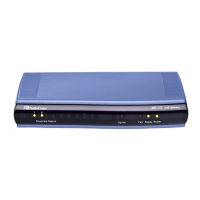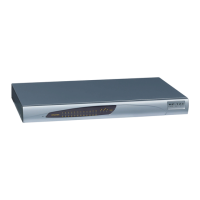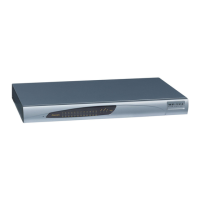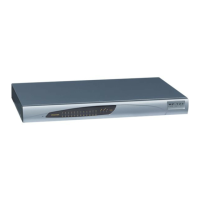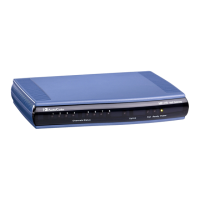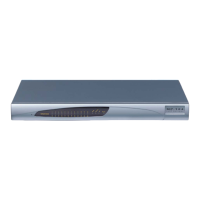SIP User's Manual 544 Document #: LTRT-12801
MP-500 MSBG
You can disable the NAT mechanism by setting the ini file parameter DisableNAT to 1. The
two parameters EnableIpAddrTranslation and EnableUdpPortTranslation allow you to
specify the type of compare operation that occurs on the first incoming packet. To compare
only the IP address, set EnableIpAddrTranslation to 1, and EnableUdpPortTranslation to 0.
In this case, if the first incoming packet arrives with only a difference in the UDP port, the
sending addresses won’t change. If both the IP address and UDP port need to be
compared, then both parameters need to be set to 1.
10.1.2 No-Op Packets
The device's No-Op packet support can be used to verify Real-Time Transport Protocol
(RTP) and T.38 connectivity, and to keep NAT bindings and Firewall pinholes open. The
No-Op packets are available for sending in RTP and T.38 formats.
You can control the activation of No-Op packets by using the ini file parameter
NoOpEnable. If No-Op packet transmission is activated, you can control the time interval in
which No-Op packets are sent in the case of silence (i.e., no RTP or T.38 traffic). This is
performed using the ini file parameter NoOpInterval. For a description of the RTP No-Op ini
file parameters, refer to ''Networking Parameters'' on page 291.
RTP No
-Op: The RTP No-Op support complies with IETF’s draft-wing-avt-rtp-noop-
03.txt (titled ‘A No-Op Payload Format for RTP’). This IETF document defines a No-Op
payload format for RTP. The draft defines the RTP payload type as dynamic. You can
control the payload type with which the No-Op packets are sent. This is performed
using the RTPNoOpPayloadType ini parameter (refer to ''Networking Parameters'' on
page 291). A
udioCodes’ default payload type is 120.
T.38 No-Op: T.38 No-Op packets are sent only while a T.38 session is activated. Sent
packets are a duplication of the previously sent frame (including duplication of the
sequence number).
Note: Receipt of No-Op packets is always supported.
10.2 Robust Receipt of RTP Streams
This mechanism filters out unwanted RTP streams that are sent to the same port number
on the device. These multiple RTP streams can result from traces of previous calls, call
control errors, and deliberate attacks. When more than one RTP stream reaches the device
on the same port number, the device accepts only one of the RTP streams and rejects the
rest of the streams.
The RTP stream is selected according to the following: The first packet arriving on a newly
opened channel sets the source IP address and UDP port from which further packets are
received. Thus, the source IP address and UDP port identify the currently accepted stream.
If a new packet arrives whose source IP address or UDP port are different to the currently
accepted RTP stream, one of the following occurs:
The device reverts to the new RTP stream when the new packet has a source IP
address and UDP port that are the same as the remote IP address and UDP port that
were stated during the opening of the channel.
The packet is dropped when the new packet has any other source IP address and
UDP port.
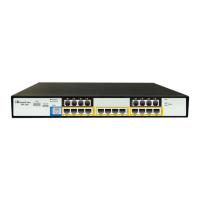
